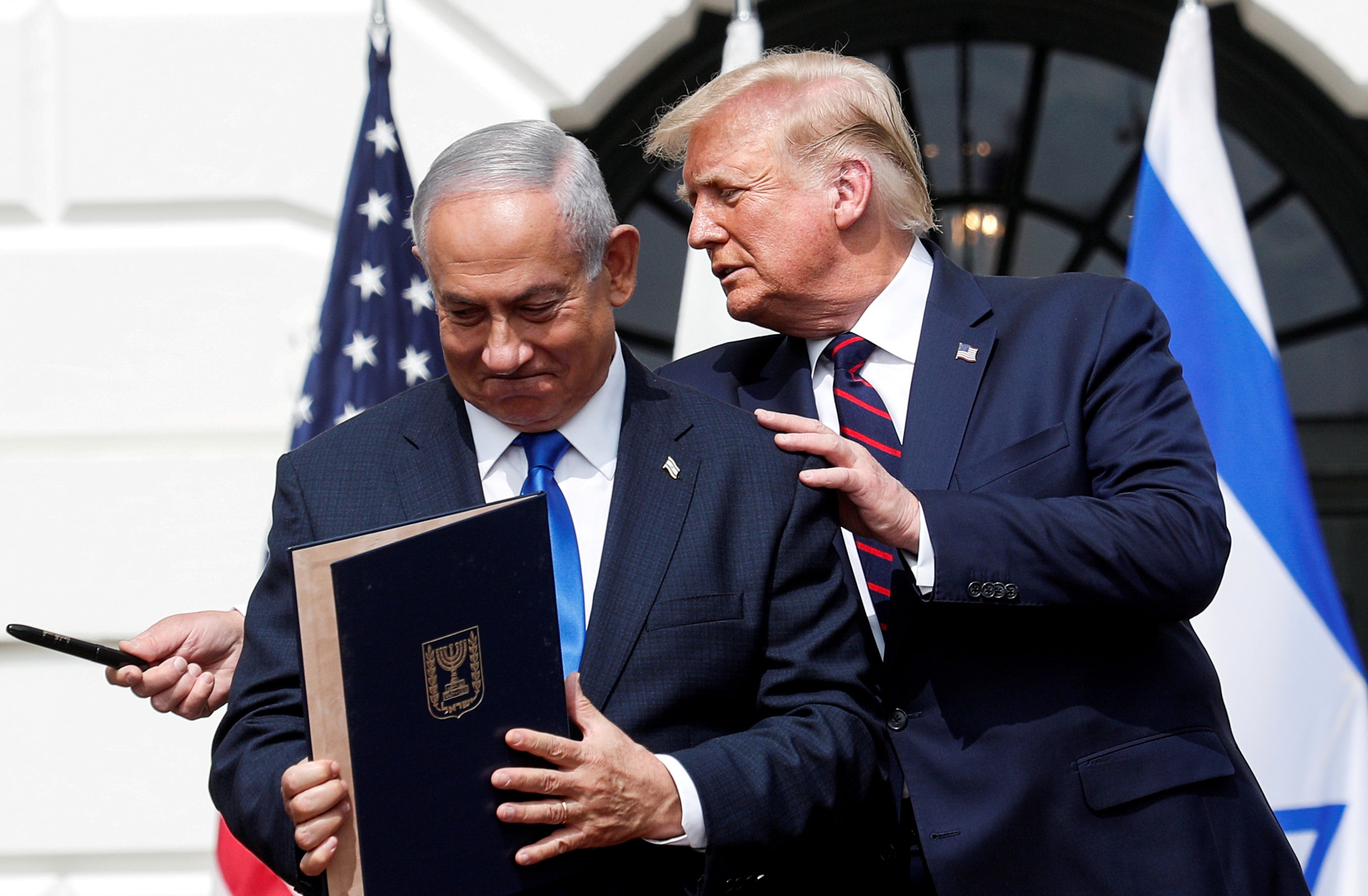Israel and Morocco agree to normalise relations in latest Trump-brokered deal
Trump agrees to recognise Morocco's sovereignty over the Western Sahara

Your support helps us to tell the story
From reproductive rights to climate change to Big Tech, The Independent is on the ground when the story is developing. Whether it's investigating the financials of Elon Musk's pro-Trump PAC or producing our latest documentary, 'The A Word', which shines a light on the American women fighting for reproductive rights, we know how important it is to parse out the facts from the messaging.
At such a critical moment in US history, we need reporters on the ground. Your donation allows us to keep sending journalists to speak to both sides of the story.
The Independent is trusted by Americans across the entire political spectrum. And unlike many other quality news outlets, we choose not to lock Americans out of our reporting and analysis with paywalls. We believe quality journalism should be available to everyone, paid for by those who can afford it.
Your support makes all the difference.Israel and Morocco agreed on Thursday to normalise relations in a deal brokered with the help of the United States, making Morocco the fourth Arab country to set aside hostilities with Israel in the past four months.
As part of the agreement, the US president, Donald Trump, agreed his country would become the first western state to recognise Morocco's sovereignty over the Western Sahara. The former Spanish territory has been at the heart of a bitter long-running conflict between the north African country and the Algeria-backed Polisario Front, a breakaway movement that seeks to establish an independent state.
The White House said that Israel and Morocco will forge diplomatic and trade relations, including the immediate reopening of liaison offices in Rabat and Tel Aviv, and eventually embassies.
The two countries had enjoyed low-level ties after 1993 when an Israeli-Palestinian peace deal was reached, but Rabat later suspended relations following the outbreak of the Palestinian uprising, known as the second intifada, in 2000.
That will now change after Washington said Mr Trump and Morocco’s King Mohammed VI agreed in a conversation that Morocco would “resume diplomatic relations [with] Israel and expand economic and cultural cooperation to advance regional stability”.
It makes Morocco the fourth Arab country to forge diplomatic ties with Israel in recent months, in deals brokered by the Trump administration that are known as the Abraham Accords. The others are the United Arab Emirates, Bahrain and Sudan.
The slew of agreements began over the summer with deals between Israel and the United Arab Emirates, Bahrain and later Sudan, sparking the ire of the Palestinian leadership, who accused its Arab neighbours and allies of “betrayals” and papering over Israel’s violations of international law.
Israel’s prime minister, Benjamin Netanyahu, welcomed the deal with Morocco as “another great light of peace”, saying there would be direct flights between the countries and the opening of diplomatic missions.
Mr Trump called the mutual agreements “historic”.
“Our two GREAT friends Israel and the Kingdom of Morocco have agreed to full diplomatic relations – a massive breakthrough for peace in the Middle East!” he wrote on Twitter.
“Morocco recognized the United States in 1777. It is thus fitting we recognize their sovereignty over the Western Sahara.”
Morocco’s royal court confirmed the news saying that Trump intends to facilitate direct flights for Israeli tourists to and from Morocco.
In a statement it also added that Washington will open a consulate in Western Sahara as part of the deal.
The Polisario Front independence movement, which is backed by Algeria, seeks Western Sahara’s independence from Morocco, which has held the vast desert region since Spain left in 1976 . Morocco regards the area, which is rich with phosphate deposits and fertile fishing waters, as an integral part of its own land. Western Sahara provides Morocco with the only land route to the rest of Africa, as the borders with neighbouring Algeria have been closed for decades.
The decision to recognise Morocco’s sovereignty over the Western Sahara breaks with decades of formal US policy. The official Washington position had been to remain neutral about the final status of the territory, and supported a 1991 ceasefire. However at the same time it did recognise Moroccan administration of the area.
A White House proclamation said the conflict had confounded international negotiators for decades and the United States believes that an independent Sahrawi State is "not a realistic option for resolving the conflict and that genuine autonomy under Moroccan sovereignty is the only feasible solution."
"We urge the parties to engage in discussions without delay, using Morocco's autonomy plan as the only framework to negotiate a mutually acceptable solution," it said.
A representative of the Polisario Front independence movement for Western Sahara said it "regrets highly" the U.S. change in policy, which it called "strange but not surprising."
"This will not change an inch of the reality of the conflict and the right of the people of Western Sahara to self determination," the Polisario's Europe representative Oubi Bchraya said.
Morocco’s deal with Israel is partly the result of prolonged efforts by the president’s senior adviser and son-in-law, Jared Kusher, and his chief international negotiator, Avi Berkowitz, who reportedly visited Morocco on several occasions. On Thursday, Kushner welcomed the agreement, adding that it was “inevitable” that Saudi Arabia would follow suit.
“This is a significant step forward for the people of Israel and Morocco. It further enhances Israel’s security, while creating opportunities for Morocco and Israel to deepen their economic ties and improve the lives of their people,” he said.
According to AFP, he added: “Israel and Saudi Arabia coming together and having full normalisation at this point is an inevitability, but the timeframe, obviously, will come – is something that has to be worked out.”


Join our commenting forum
Join thought-provoking conversations, follow other Independent readers and see their replies
Comments